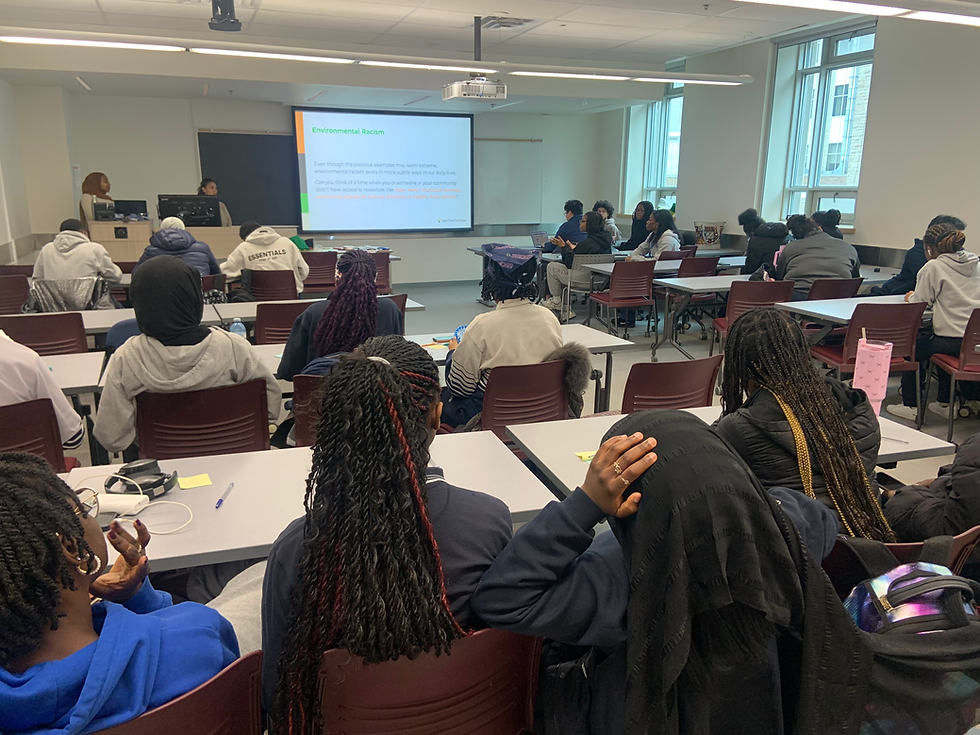Improving lives - an approach to addressing gender inequality in STEM
- Andrea Hemmerich

- Mar 3, 2019
- 3 min read
(This post was originally published on LinkedIn in November 2017.)

When I completed my undergraduate degree in mechanical engineering, my class consisted of about 20% women. Almost two decades later I cringe that we “celebrate” 30% female enrolment rates at Canadian universities. More depressing is the gender ratio of licensed engineers in Canada sitting at about 12%, which shows that of those women who entered the program with me a substantially greater percentage of us are no longer considered “engineers” when compared with our male counterparts. Why is it taking so long to change the status quo?
"UP4 The Challenge" was developed with the intention of bringing more girls and underrepresented groups into the Science, Technology, Engineering & Math (STEM) fields - yet, we neither target a specific population nor focus on these disciplines in our program. So how do we expect to achieve these goals?
What has been recognized more and more in the field of engineering is that there is a lack of connection with the people who are at the heart of our work. According to Dr. Tyseer Aboulnasr at the University of British Columbia, “we lost the message that engineering can improve people's lives.” Dr. Lina Nilsson at the University of California, Berkeley, showed that “engineering projects that attempt to achieve societal good” consistently had higher than average ratios of women.
UP4 The Challenge was designed to focus on a societal issue that affects people in our own community. For the challenge to be meaningful to our program participants, we’ve partnered with a local organization (the Parkdale Food Centre) that has identified real needs for the community it serves ... and these needs are not confined to a required piece of technology. In other words, we can naturally implement an interdisciplinary, user-centred design approach, in which our Fisher Park Summit School designers must connect with all aspects of the solution (e.g. social, financial, technical, etc.) in order to ensure its success. This is how STEM expands to STEAM: including ‘Arts’ not just in our understanding of the problem, but also in our solution.
For the challenge to be meaningful to our program participants, we’ve partnered with a local organization that has identified real needs for the community it serves ... and these needs are not confined to a required piece of technology.
And what if the solutions that are proposed by the program participants at the end of the program aren’t technical at all? Do we still anticipate that the students will have any greater appreciation for the ways in which STEM fields can improve people’s lives? We’re now partway through the program; based on our preliminary outcomes, I would say we’re at least on the right track. Of the kids who are taking part in the UP4 Challenge, more than half are girls. And an example of a prototype that was created by one of these girls during the Design Thinking Crash Course is a miniature drone designed to carry in firewood during the cold winter months for use in a pizza oven!
Of course, it’s possible that the solutions proposed by the participants at the end of the UP4 Challenge to address the Parkdale Food Centre’s needs will not involve a single piece of technology. What we are experiencing, however, is that participants are recognizing the potential for integrating STEM tools or approaches in design for societal good. At the very least they’ll know that the UP4 Challenge is itself a prototype designed by a team of five people with backgrounds in STEM, highlighting the more expansive role that STEM professionals can take in society. Considering the positive comments received thus far from both our community partner — “This is important” — and program participants — “It was fun!” — I’d like to think that this initiative has already had positive impact with more to come.







Comments